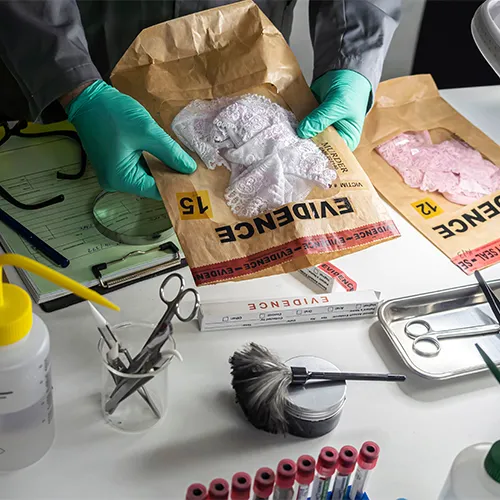Sexual Assault Attorney in North Carolina
Have you been a victim of sexual misconduct? A skilled sexual assault attorney can help. Contact Gloria Becker today to get started!

What is Civil Sexual Assault
A civil sexual assault case allows the survivor to sue the perpetrator directly.

Unlike criminal cases which are about punishment, these cases are about compensation and justice for the victim. Gloria Becker Law is here to help break down the differences between civil and criminal sexual assault cases, how to file a civil lawsuit and what to expect during the process.
Fast Facts
- Civil sexual assault cases are different from criminal cases mainly in purpose, burden of proof and initiation, civil cases are about compensating the victim and has a lower standard of proof.
- Survivors can file civil sexual assault lawsuits even without criminal convictions, using evidence such as medical records, witness testimony and digital communications to prove their case and get various types of damages.
- Knowing the statute of limitations is key to filing civil sexual assault cases, as these time limits vary by state and for minors or childhood abuse cases which affects the survivor’s ability to get justice.
Civil Sexual Assault vs Criminal Sexual Assault
Understanding the difference between civil and criminal cases is important when going through the legal system for sexual assault.
A criminal sexual assault case is to determine the guilt or innocence of the defendant which is the foundation of the process. These are prosecuted by the government and if the defendant is found guilty the outcome can be imprisonment, fines, probation or other penalties. A civil sexual assault case is to compensate the victim through monetary awards. And knowing the criminal case implications is important for everyone.
A big difference is the standard of proof. In criminal cases the prosecution needs to prove the defendant’s guilt beyond a reasonable doubt, a high standard that often results in acquittals if there’s doubt. In civil sexual assault cases the burden of proof is lower. The plaintiff needs to show it’s more likely than not the assault occurred, which means at least 51% certainty.
Another difference is who initiates the case. Criminal sexual assault cases start with the government, usually after a law enforcement investigation. Civil cases start with the survivor, who sues the perpetrator and possibly other parties. This gives the survivor more control over the case, the evidence presented and the damages sought. Survivors can also file a civil lawsuit even without a criminal conviction. Contact Gloria Becker Law today about your personal injury lawsuit!

Filing a Civil Sexual Assault Lawsuit
Your safety is first after sexual assault.
After safety, documenting the abuse, including dates and details, is crucial to building your case. This documentation will be used to prove your claims and help the legal team to build your story.
Consulting a sexual assault lawyer like Gloria Becker with experience in civil sexual misconduct in Raleigh, NC is next. Contact Gloria Becker today about your civil sexual assault case! She will walk you through the process, explain your rights and options. Gloria will get the evidence, represent you in court and negotiate settlements. Working with a specialist means you get the best advice and representation.
Civil cases are separate from criminal charges. You can file a civil lawsuit even without criminal charges or a conviction. Filing a civil lawsuit for sexual assault can bring a sense of justice and closure, hold the perpetrator accountable and get financial compensation through a sexual assault civil lawsuit.

Burden of Proof in Civil Sexual Assault Cases
The burden of proof in civil sexual assault cases is lower than in criminal cases.
While criminal cases require proof “beyond a reasonable doubt”, civil lawsuits require proof by a “preponderance of the evidence”. The plaintiff needs to show it’s more likely than not the assault occurred. This lower burden means a civil case can succeed even if the accused was not found guilty in criminal court because of lack of evidence.
The standard of proof in civil cases is at least 51% certainty. This means it’s easier to prove a civil case and get justice and financial compensation even when the criminal justice system fails in the civil court.
Filing civil claims complements criminal prosecution so survivors have multiple ways to hold abusers accountable.
Types of Damages in Civil Sexual Assault Cases
Survivors in personal injury lawsuits such as civil sexual assault cases can claim various types of damages as compensation for their harm.

These are economic and non-economic damages. Economic damages are for medical expenses, mental health treatment and lost wages. Survivors can claim past and future medical costs related to the assault so they can cover ongoing treatment.
Non-economic damages cover the emotional and psychological harm of the assault. This includes compensation for emotional distress, pain and suffering and psychological trauma. These damages acknowledge the deep and lasting impact of sexual assault on a survivor’s life. In cases of egregious conduct, punitive damages may be awarded to punish the defendant and deter future behavior.
Survivors can also recover out of pocket expenses incurred because of the assault, including legal fees and other related costs. So survivors are not financially burdened by the legal process and can focus on recovery. Overall the civil justice system aims to provide full financial compensation to help survivors rebuild their lives.
Statute of Limitations for Sexual Assault in North Carolina
The statute of limitations is a key factor in filing a civil sexual assault lawsuit.

This time limit varies by state and is the time frame in which you can file a lawsuit after the assault. For adult survivors the time limit is up to 20 years from the date of the assault, but for minors or those who didn’t immediately realize the full extent of their injuries the statute of limitations can be extended.
States have different provisions for childhood sexual abuse cases. Some states extend the time limit to 30 years from the victim’s 18th birthday, others have eliminated the statute of limitations for childhood sexual abuse cases. These extended timeframes recognize the unique challenges faced by survivors of childhood sexual abuse who may take years to come to terms with what happened and seek justice.
Some states also have provisions for victims to sue institutions where the abuse occurred, such as schools or churches. This is particularly important in holding organizations accountable for not protecting children from abuse.
Know your state’s statute of limitations and act within it. Take the next steps in filing your civil lawsuit!

How to Prove a Sexual Assault Case
To prove a civil sexual assault case you need strong evidence to prove the assault and its impact on the survivor’s life.
Various types of evidence are key to building a strong case. Medical records are important as they confirm injuries or relate to the assault. These records include physical exams, psychological evaluations and any treatment received because of the assault.
Witness testimony is crucial in civil sexual assault cases. Testimony from people who saw the victim’s distress or interactions with the perpetrator supports the survivor’s claim.
Forensic evidence such as DNA can tie the accused to the assault and support the victim’s claims. Digital communications such as texts and emails about the incident can also be evidence.
Third Party Liability in Sexual Assault Cases
In civil sexual assault cases the perpetrator is not the only one who can be held accountable.

Victims can sue multiple parties if other individuals or institutions failed to prevent the assault. This is called third party liability.
Potential liable parties are:
- Landlords
- Businesses, such as massage spas and gyms
- Government entities
- Schools
- Employers
For example if an assault occurs at a business or school the institution can be held liable for not providing a safe environment.
To prove third party liability you need to show a breach of duty. This means showing the third party had a duty of care to provide a safe environment and failed and that failure caused the assault.
Holding third parties accountable gives you more ways to get compensated and makes institutions take their safety responsibilities seriously.
Challenges and Considerations in Sexual Assault Cases
Civil sexual assault cases have their own challenges and considerations.
A big challenge is getting compensation if the perpetrator has no assets. Even if you win, getting damages may depend on the perpetrator’s ability to pay. Liability insurance doesn’t cover intentional acts so it complicates the recovery process for victims.
Despite these challenges a civil case gives survivors more control. Survivors can direct the case, decide what evidence to present, decide what damages to seek. Documenting noticeable changes in behavior and emotional distress can support your claim and strengthen your case. Expert testimony can explain the psychological impact of the assault on you.

Help After a Sexual Assault
Immediate medical attention is crucial after a sexual assault.
Go to a hospital for a Sexual Assault Nurse Examiner (SANE) exam. This exam provides medical care and collects forensic evidence useful in both criminal and civil cases. You don’t have to report the assault to the police to get a SANE exam.
Legal and emotional support is just as important. Many organizations offer free consultations and confidential support to sexual assault survivors. Contact these resources including the national sexual assault hotline to get information on legal options and access to therapy and mental health services.
By doing this you will also be able to get justice and hold your abusers accountable.
Frequently Asked Questions
What is the purpose of a civil sexual assault case?
The purpose of a civil sexual assault case is to get financial compensation for the victim’s damages. This is to acknowledge the harm and get justice for the victim.
How does the burden of proof differ in civil and criminal sexual assault cases?
The burden of proof in civil sexual assault cases is a preponderance of the evidence, which is more than 50% whereas in criminal cases it’s beyond a reasonable doubt, which is a much higher standard. This shows the different levels of proof required to establish liability or guilt in these two legal contexts.
What damages are awarded in civil sexual assault cases?
In civil sexual assault cases, damages can be medical expenses, lost wages, emotional distress and punitive damages for egregious conduct. This compensation addresses both the financial and emotional harm to the victim.
Can a survivor sue if there was no conviction in the criminal case?
Yes, survivors can sue even if there was no conviction in the criminal case. The civil system is separate and doesn’t require a conviction to get compensation.
What should a survivor do immediately after a sexual assault?
A survivor should get to a safe place and seek medical attention immediately after a sexual assault. Document the incident and consult with a lawyer who specializes in sexual violence in Raleigh, NC.
Is there a statute of limitations on sexual assault
Yes, there is often a statute of limitations on sexual assault cases but it varies widely depending on the jurisdiction and the case. In many states the statute of limitations for adult sexual assault cases is a few years to up to 20 years from the date of the assault. But for cases involving minors or childhood sexual abuse the time limits are often extended. Some states have provisions that allow survivors to file a lawsuit many years after the abuse occurred, recognising it can take time for victims to come to terms with what happened and seek justice. Some states have abolished the statute of limitations entirely. In North Carolina, the statute of limitations for intentional torts, such as assault and battery, is 3 years.
Contact Gloria Becker Law About Your Civil Sexual Assault Case
Survivors need to know civil sexual assault cases to get justice.
"*" indicates required fields
